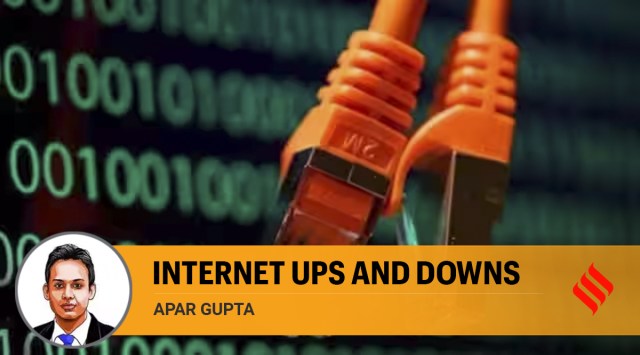
On September 23, 2023, Manipur’s chief minister triumphantly announced the restoration of full internet access, attributing it to “improved” law and order. This ended India’s second-longest internet blackout, which had stretched for over 143 days since May 3. The news was greeted with relief by citizens — from students planning their return to Manipur to aid workers scrambling for essential supplies. Yet, this respite was fleeting. Within two days, the nation was jolted awake by horrific images of two slain Meitei students. The ensuing outrage and protests in Imphal were met with a familiar governmental response: Another shutdown of mobile internet access.
In a previous article (‘Shutdown is no cure’, IE, August 4), I laid out data, research and expert opinion debunking the efficacy of internet shutdowns in preventing violence. So, is the state acting on mere dogma? The answer lies in a pattern. Both the recent tragedy and an earlier incident, the sexual assault of two Kuki-Zo women, whose video was made on May 4, unfolded in a similar manner: Violence occurred weeks before the public exposure of the episode, and each revelation coincided with some form of internet restoration, which was then followed by reimposition of shutdown amid public calls for justice. Disturbingly, official action — be it police intervention or arrests — kicked off only after public outrage. These aren’t isolated events but threads in a tapestry of ethnic conflict, marked by frequent loss of life and property. The state’s failure to protect its citizens raises questions about the chief minister’s competence. It underpins a lack of confidence in the state as a recurring theme for protests in Imphal, regardless of internet access. In this climate of mistrust and fear, one can argue that shutdowns serve the government more than the citizens, offering a cynical advantage with minimal risk.
The institutions which serve as checks on a state government are either offering tacit support or adopting wilful ignorance towards internet shutdowns. The Union government, far from being a moderating force, has set its own precedent with a 552-day shutdown in Jammu and Kashmir. The Department of Telecom refuses to maintain a centralised database and has proposed a Telecom Bill that retains unchecked power to implement internet shutdowns. This attitude towards internet shutdowns was evident in a recent Council on Foreign Relations event featuring the External Affairs Minister on the very day the internet shutdown was reinstated. When questioned about India’s democratic decline, as indicated by the Freedom House rankings that factor in internet shutdowns, he dismissed it as having an “ideological agenda”. On the Manipur conflict, he labelled a joint statement by thirteen special rapporteurs and six experts at the United Nations as “presumptive,” attributing the strife to “long-standing tensions”. Even if we accept this reasoning as correct, does it excuse the responsibility of the chief minister? Does it justify an internet shutdown?
Questions that find space in news articles and public lectures are conspicuously absent from our courts. The Supreme Court has dodged the internet shutdown issue in three separate cases, while the High Court of Manipur, over sixteen hearings, has fixated on “limited internet shutdowns”. This notion is gaining traction, notably in a recently concluded Telecom Regulatory Authority of India consultation that tackled both net neutrality and internet shutdowns. While public attention veers toward net neutrality, the “limited internet shutdowns” were largely ignored, especially by the tech startups as well as large online companies wary of wading into “national security”. Yet, a cautionary note is warranted: Major telecom players like Reliance Jio, Bharti Airtel, and Vodafone are advocating for service-level blocks by internet companies, a move that could not only increase compliance burdens but also risk government-dictated “essential” internet services. The private sector also needs to draw lessons from Manipur and ask itself, will there be any net neutrality without the internet?
In the absence of accountability from centres of privilege, power and profit, internet shutdowns will continue to metastasise on our body politic to prevent public assembly and protest. We have not seen the last images of violence and brutality from Manipur, for they reflect a deep-seated social discord and a breakdown in public trust. Our responses will numb with time, apathy will build up again, but the tragedy in Manipur will not atrophy. The term “cycle of violence,” is aptly used here. It was coined by Lenore Walker to describe situations of domestic abuse, and is no longer used in this context. However, it captures the toxic relationship that can develop between the state and its citizens. Those in power persist in depriving citizens of digital access to essential aspects of life, all to evade accountability. Cycles do not stop by themselves. To end, they require political leadership, not the continued use of “limited internet shutdowns” in Manipur.
This article was first published in the Indian Express on October 6, 2023.